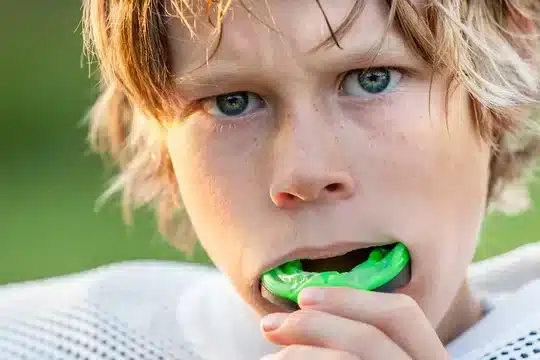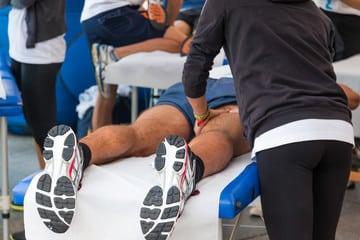We all know that mouthguards are important for contact sports. Mouthguards can defend your smile from knocks and tumbles while playing contact sports, they provide more benefits than just protecting teeth. Let’s look at the other benefits of wearing a mouthguard to ensure comprehensive protection on the field:
1. Protect Against Injury
Keep yourself safe and sound when engaging in sports, activities or everyday living with a custom-fitted mouth guard. It's the most dependable way to protect your face from any blows. It should be tight but not too tight on either side of your upper teeth so you can still breathe through your nose comfortably during use. And don't forget about materials – certain densities and thicknesses might feel better than others inside that pretty smile of yours.
2. Keep Teeth Healthy
Don't let your love of contact sports compromise the health and stability of your teeth, protect them with a mouth guard. Not only can they safeguard against tooth damage, but also help lower the risk of gum disease. Those who wear braces or have other dental work won’t worry about participating in their favourite sport as much if proper protection is worn.
When selecting a custom-made mouthguard, comfort is an important factor to consider. Use the guards that are uniquely designed for your smile like custom-fitted sports mouthguards from MofoSmile that keep your teeth safe in the field with its shock-absorber technology. Different materials provide varying levels of density and thickness that can make all the difference when it comes to feeling at ease while wearing your guard. Choosing wisely could save you from some uncomfortable moments.
3. Prevent Cavities and Tooth Damage
Wearing a mouth guard while playing contact sports is one of the best ways to protect your teeth. Mouth guards help prevent dental injuries, including:
- Tooth damage caused by falls or collisions with other players
- Damage that can occur during chewing on objects like helmets and sticks
- Cracked teeth and chipped enamel due to grinding or clenching your jaw when you're nervous or stressed out
4. Avoid Headaches and Nausea After the Game or Practice
Mouth guards are designed to absorb the shock of impact, so if you're playing contact sports, wearing one can help prevent headaches and nausea after games or practices.
Athletes who wear mouthguards report feeling less pain and fatigue than those who don't. This is because they aren't absorbing as much force with their jawbone - the most common place for concussions in contact sports.
5. Prevent Jaw Pain and Temporomandibular Joint Disorder (TMJ)
Protect your smile while you play with a mouthguard. Mouthguards help to reduce the risk of injury and also protect against TMJ - a painful disorder that can cause discomfort when eating or speaking. By absorbing shock during contact sports like football or hockey, they may be instrumental in helping counteract potential jaw issues before they arise. So, make sure to wear yours for optimal protection, it's always better safe than sorry.
6. Comfort and Convenience
Mouth guards are the perfect solution for athletes looking to protect their teeth, mouth and jaw from injury without any interference with breathing. They're simple to use, just slip them on before a game or practice and no fussing around getting them in place or having difficulty removing them afterwards. And when you need some refreshing cleanliness, they’re as easy to wash off either under running water alone or with soap if that's what takes your fancy. There are different types of mouthguards for sports like football, basketball, hockey or other contact sports, so you'll definitely find one suited perfectly for you.
7. Younger Looking Teeth
Wearing a mouth guard is essential for protecting your teeth during contact sports. A well-fitting one can help absorb the shock of any impact and keep your mouth from opening too wide, preventing more serious damage to pearly whites. But that's not all, it could also protect against tooth decay over time. The soft material used in most guards provides just enough space for normal chewing activities, meaning less plaque build-up around crowns or fillings in the long run, another win-win situation when you’re talking about excellent oral health.
8. Breathe Easier and Improve Oral Hygiene
Playing contact sports can be tough on your mouth, but wearing a mouthguard could make it easier to breathe and help you keep better oral hygiene. Not only does the guard prevent your tongue from getting caught in between teeth for improved airflow through your nose, but it also helps reduce bad breath with fewer food particles sticking around after eating or drinking something sweet. And less chance of bacteria growing inside when using plastic resins over rubberized materials keeps cavities at bay too.
Enhance Your Appearance and Improve Your Confidence
Get ready to put your best face forward with a mouthguard. Not only will you be protecting yourself and enjoying greater safety in sports, but this simple solution also offers up the chance for an improved appearance. Feel more confident as it can help restore the natural shape of your teeth.



